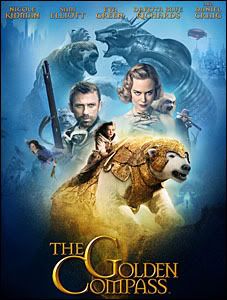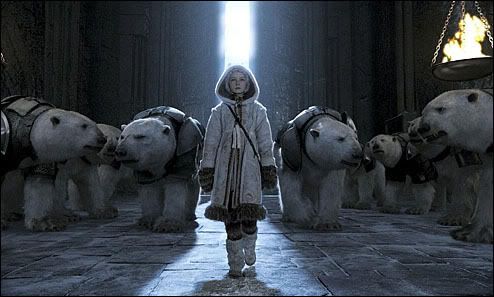 Starring:
Starring:Nicole Kidman, Daniel Craig, Dakota Blue Richards, Eva Green, Sam Elliot, Adam Godley, Tom Courteney
Director:
Chris Weitz (About a Boy)
MPAA Rating:
PG-13 for sequences of fantasy violence.
Release Date:
December 2007
Synopsis:
After overhearing a shocking secret, precocious orphan Lyra Belacqua trades her carefree existence roaming the halls of Jordan College for an otherworldly adventure in the far North, unaware that it's part of her destiny.
My Two Cents:
There is no God. That’s the first thing I heard about The Golden Compass from a guy that saw the film. He said the movie was about killing God and making the Catholic church look bad. My only thought were “I gotta watch this movie!”
Try ignoring what you have heard or read about Philip Pullman’s book trilogy His Dark Materials being pro atheism and against Catholics. Well OK, Pullman did say “I suppose technically, you'd have to put me down as an agnostic. But if there is a God, and he is as the Christians describe him, then he deserves to be put down and rebelled against.” Holy shit, this really is about defeating God. It’s no surprise this remark raised controversies, but remember, this is a fairy tale. People didn’t seem to mind watching Jesus get whipped mercilessly for two hours in Passion of the Christ. That movie grossed over $600 million dollars worldwide. Sure, absolutely everything that has to do with religion offends someone, but that’s exactly why director Chris Weitz decided to tone down the anti-God stuff for The Golden Compass. This pissed off many people, but what’s done is done.
In an alternate world, people walk around with their souls outside their bodies. They manifest themselves as animals called dæmons. When your dæmon dies, so does the carrier, and vice versa. Lyra Belacqua, the story’s main character, has a shape-shifting dæmon as well as every other kid. After the kid grows and becomes an adult, the dæmon loses its ability to shape-shift and settles with just one form. Lord Asriel, an aristocrat and scientist, thinks that it is possible to travel to other worlds using particles called Dust. Unfortunately for him and his experiments, Dust is considered to be linked to the original sin, thus labeled taboo. The Magisterium, the authority that controls pretty much everything, is trying to come up with a way to separate people from their dæmons without the person dying. According to them, Dust makes people have bad thoughts during their adulthood, so they start kidnapping children and forcing them to go through their risky experiments in order to “save” them. When the Magisterium kidnaps Lyra’s best friend Roger, Lyra sets out on her own to find him and the other kids. If you don’t know what the hell I’m talking about, I have to say I don’t understand it either. Moving on…
Besides calling one’s soul “dæmon”, which of course resembles the world “demon”, the world of The Golden Compass also deals with racism. Yes, more reasons for haters to pick on it. There are the evil Gobblers, the dirty Gyptians, and the magical Witches. There are also Angels, Deaths, Specters and more, but those are from the second and third tomes of the trilogy.

So, is the movie fun? In a word, yes. I didn’t enjoy it as much as say, the first Harry Potter or The Chronicles of Narnia, but it wasn’t bad. Actually, I should mention that writer Philip Pullman said His Dark Materials is the anti-Narnia. I’m not sure what this means, but there you go. Just like in the other movies I mentioned, there are a lot of neat special effects. All the dæmon are made with realistic CGs, and then there are the awesome polar bears. You’ve seen them in the trailers, they’re cool. The Golden Compass even won an Oscar for best special effects. I wasn’t too happy about that because I though the effects for Transformers were better. Oh well.
If you have an open mind and enjoy fantastical tales of talking animals, sorcery, and killing God, you might have a swell time with this film. That said, if you’re a fan of the books you might be greatly disappointed as New Line took way too many liberties and toned down the controversial aspects to reach a wider audience. They basically took the book’s soul out. Shame on you, New Line. The movie wasn’t received in the U.S. as warmly as New Line had anticipated, and the $180 million budget didn’t help either. It fared better overseas, helping it make about $330 million. Still not good enough to guarantee a sequel. This is still being debated by New Line, though. Let’s hope they work something out because the ending to The Golden Compass kind of sucked, similar to the one in The Fellowship of the Ring. Just when you’re ready for more action, it ends.
Score:

Trivia:
The Golden Compass is the American title of the book which Philip Pullman published in the UK as Northern Lights.
Daniel Craig was a fan of the books before he was involved with the movie, as was Dakota Blue Richards who has read the books and saw the National Theatre stage play.
Philip Pullman had originally wanted Jason Isaacs to play Lord Asriel, Nicole Kidman to play Mrs. Coulter and Samuel L. Jackson to play Lee Scoresby. But as the author has no role in casting, in the event only Kidman made it into the film.
In December 2004, Chris Weitz resigned from directing the film, claiming he was daunted by the technical challenges of the story. In August 2005 Anand Tucker (Shopgirl) was hired to replace Weitz, with the 24-carat approval of Philip Pullman himself. Tucker felt that the film would have as its central theme "Lyra's search for self-discovery and for a family." In May 2006, however, he resigned, citing creative disagreements with New Line Cinema, and Weitz returned to direct.
Lord Asriel is played by Daniel Craig, who is also the current James Bond. The part was previously played, in a London stage adaptation, by Timothy Dalton, himself a former Bond.
Ten thousand girls turned up for open auditions in Cambridge, Oxford, Exeter and Kendal for the role of Lyra Belacqua.
In July 2003 Tom Stoppard (Shakespeare in Love) was hired to write the screenplay. A year later, when Chris Weitz was hired to direct, he rejected Stoppard's script, preferring to adapt Philip Pullman's work himself.












3 Comments:
Pullman did indeed say 'My books are about killing God' and he is also 'trying to undermine the basis of Christian belief'.
Yeah, good luck with that, pal.
This didn't bother me a whole lot. The idea of just plain killing God is simply ridiculous. and also not what I call 'imaginative' or even 'shocking', etc. I call it boring and uninspiring.
What does bother me though is how exceedingly intolerant this man obviously is for my faith, and its followers. Again, he freely admits he's trying to 'undermine the basis' of our beliefs. Yes, that's what tolerant people do. He's free to believe whatever he wants, and write whatever he wants, but his goals demonstrate to me that he is not a tolerant man, when it comes to people who disagree with him. When people of my faith discuss or even mention things they believe, they are called 'intolerant', or 'hateful', etc. But jokers like this who clearly are themselves intolerant and hateful towards my faith, no, that seems to be perfectly okay, oftentimes. That I also have a problem with.
Well, I can tell you this man is going to fail at 'undermining the basis' of my faith. At least, by himself. But if we do let too many people act intolerantly towards my, or any faith, that is dangerous...
This movie actually isn't the one in which....'God' is 'killed' anyway. And well, I have to wonder if that one even will be made. Or if it is, how will that scene be handled.
He probably likes creating controversy, as it generates more interest in his books. Didn't Xenogears have a sort of 'kill God' thing going? I know that game also raised controversies.
The movie adaptation is a lot less direct in its attack against the Catholic Church, mesa thinks. Maybe you'll watch it sometime, if only to watch the cool bear brawl that gave the movie a PG-13 rating. Those bears can fight, man.
There's already a movie where God is killed, and that movie is Jurassic Park. Ian Malcolm reveals the horrible truth when he sais: "God creates dinosaurs. God destroys dinosaurs. God creates man. Man destroys God. Man creates dinosaurs."
Beh. I think it's more than a matter of liking controversy. He just plain sounds intolerant to me.
Xenogears did look like it started that as you suggested. When Fei meets Graf, Graf does say his mission is to kill God, yes. but as you actually play the game, you see that that isn't....really what the point is. Some people say that about Pullman's books, too, but then I just remind them that no, he DID say that 'killing God' IS the point of his books. And that his mission; to kill God, and 'undermine' the Christian faith. So there you go.
True, Malcolm did say that, but...I think you know what he was really going on about. :P
Post a Comment